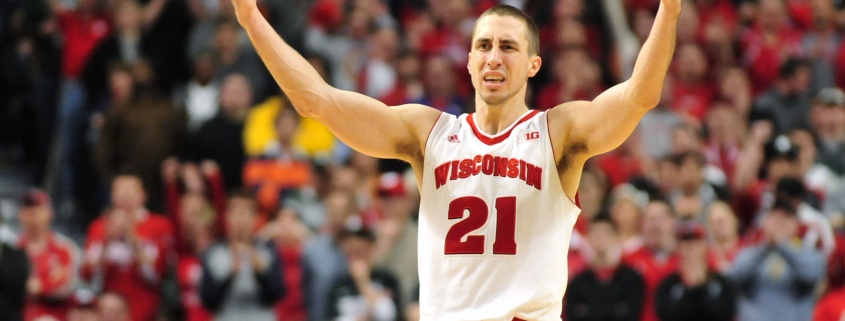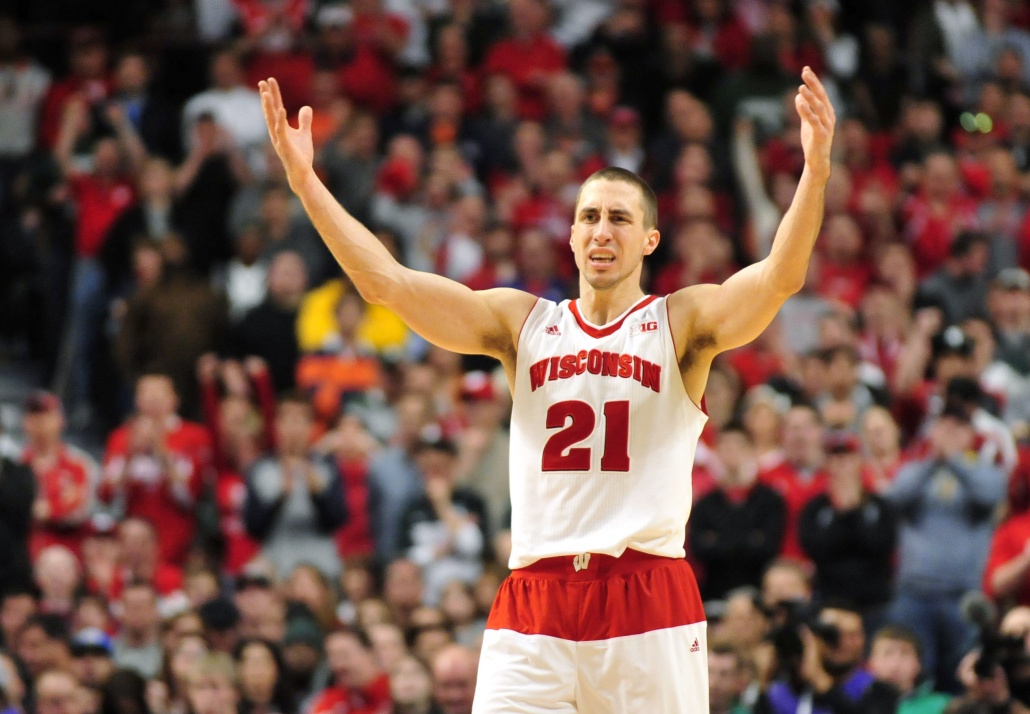Student athletes deserve part of profits

Wisconsin Badgers guard Josh Gasser reacts during overtime in the championship game of the Big Ten tournament against the Michigan State Spartans at the United Center. Photo credit: David Banks / USA Today Sports.
By Ibrahim Abdul-Matin
While I am thoroughly enjoying watching Pakistan, Bangladesh, South Africa, Australia, and India who have all made the elimination round of 8 in the Cricket World Cup, I must say that my attention is still fully captured by the upcoming NCAA basketball championships, better known as March Madness.
Both events feature showdowns of classic teams locked in existential showdowns. These are the moments that have sports fans salivating. We want drama, improbable comebacks, underestimated sides, intense stadiums and ridiculously loyal fans – it’s sports at its best.
But March Madness is not as it seems. The NCAA basketball tournament is a billion dollar industry with executives making millions while some of the athletes (read: workers), struggle to eat a decent meal. We watch the spectacle but the system behind the spectacle is rotten and needs to be fixed.
I remember all too well the financial struggle of being a college athlete. My experience is best captured in recent statements made by the all-pro Superbowl champion Richard Sherman.
“Most of these kids are done with school, done with class by 3 o’clock. You’ve got the rest of the day to do as you please… when you are a student-athlete you don’t have that kind of time. You wake up in the morning, you have weights at this time, and then after weights, you go to class and after class maybe try to grab you a quick bite to eat and after you get your quick bite to eat you go straight to meetings and after meetings you go to practice and after practice you got to try to get all the work done you had throughout the day… those aren’t the things people focus on when talking about students athletes…”
We don’t focus on these things while watching student athletes either. We watch for grit and glory. We do not see the lives of these young men and women after walking off the court or field. We do not see their constant worry about food, clothing, and keeping up with their studies.
It is hard to imagine a potential national champion without any money when the university is making millions off their effort. Richard Sherman elaborates:
“…Well, I can tell you from my experience… usually my account was in the negative more than it was in the positive”
Good thing he went pro. Sadly that accounts for less than 2% of NCAA athletes.
Student athletes cannot work while playing. Yes, our education and room and board is paid for. But what about food after hours? What about other necessities? I was always broke. So, while watching this year’s would-be champions like Kentucky’s undefeated squad or the Connecticut women – both of whom are the number one seeds and the teams to beat – also think about the athletes’ reality.
“Even thought we had structured study halls on the road for guys to get their stuff done, it’s challenging to care about school at that time. You are caught up in March Madness. Especially athletes these days that are on twitter and Instagram… it’s harder for people to focus,” says Jonathon Benjamin, former basketball player at the University of Richmond (he was part of the 2011 Atlantic Ten champions that made to the Sweet Sixteen).
Incidentally, Jonathon lost his eligibility for a summer just because he had his own clothing line.
Shabazz Napier, the UCONN guard whose heroics lead his team to an improbable run last year was quoted as saying, “sometimes, there’s hungry nights where I’m not able to eat, but I still gotta play up to my capabilities.” Only after his statement did the NCAA approve unlimited meals for NCAA Division I athletes.
The lesson here is this: athletes need to continue to speak up and organize to get the basic rights they deserve. The more they organize the better they will be. For the champions, you have an opportunity to use your platform to be an advocate for current and future athletes. Do not be afraid to use that space to speak truth to power. And for us spectators we should no longer be blind to the challenges that young athletes face and support them in their efforts to fight the power.
















2015
740 views
views
0
comments